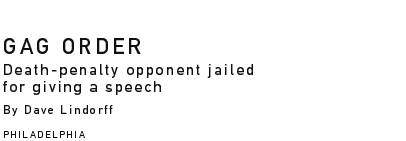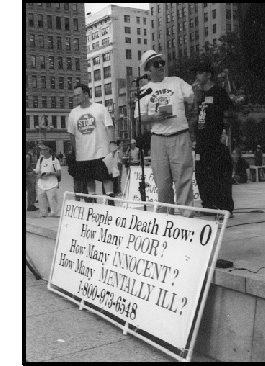 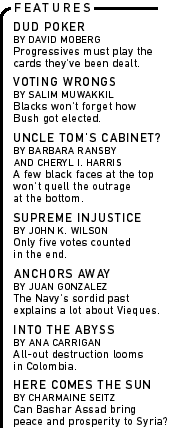
|
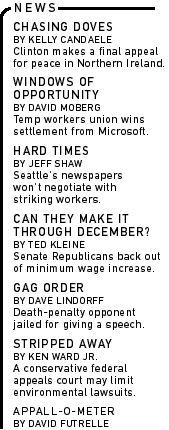
|
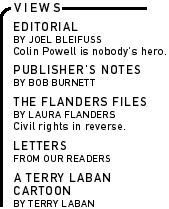
|
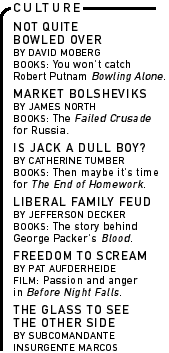
|
| |
|
|
|
The First Amendment took a nasty hit here in early December in the courtroom of Federal Magistrate Arnold C. Rapoport, when C. Clark Kissinger was sent to jail for giving a speech. An activist with Refuse & Resist!, Kissinger has been leading that organization's international campaign on behalf of a new trial for Pennsylvania Death Row inmate Mumia Abu-Jamal. Technically, Rapoport simply jailed the 60-year-old Kissinger for violating the terms of his probation. However, it appears that the judge really punished Kissinger for traveling from his home in New York to Philadelphia in order to speak at a legally permitted rally during the Republican National Convention. He was sentenced to 90 days in jail. The basic issues of the case were not in dispute. Indeed, federal prosecutors and
Believing that his travel restriction was an unconstitutional denial of his free speech, Kissinger ignored the ban and came to Philadelphia, delivered the speech and returned to New York. Kissinger explained to the court that over the course of his probation, he had made six requests for permission to travel. Three of these, he said, were not political in nature and involved visiting his ailing mother in Massachusetts. All of these were readily granted by his probation officer. Three other requests, all involving political rallies or events at which Kissinger, in his professional capacity, was to participate and speak, were referred to and then denied by the judge, an act which Kissinger claims is clear evidence that he was being barred from speaking, not from traveling. Initially, Judge Rapoport refused defense requests to explain why he had denied Kissinger's request to come to Philadelphia, saying, "I denied it because I denied it." But when National Lawyers Guild attorney Andrew F. Erba noted that a recent appellate court decision had established that judges should clearly state the reasons for any sentence in probation violation cases, the judge relented. His subsequent explanation made it disturbingly clear that Kissinger's words were precisely the issue. "Past behavior shows that his speech ends in civil disobedience," Rapoport said combatively. "You want to know why? There's your answer. Do you want to know anything else?" Kissinger, who came to the hearing with a toothbrush protruding from his jacket pocket, seemed to have anticipated the outcome. But his attorney Ron Kuby was shocked. "I can't believe I would ever sit in an American courtroom and actually contemplate the notion of a defendant being sent to jail for giving a speech," he said, shaking his head. Assistant U.S. Attorney Richard Goldberg, who prosecuted the case and requested the 90-day sentence, argued that the case was not about speech, but simply about violation of the terms of probation. The judge, however, made the reality very clear: Kissinger was denied permission to travel because of fears about what he might say. The harsh sentence is only the latest in a series of heavy-handed legal assaults on dissidents in the city that calls itself the "Cradle of Liberty." After mass arrests during the Republican Convention, several hundred activists were jailed by city, state and federal law enforcement authorities and slapped with unusually high bail--in some cases in the six-figure range--for offenses that were often just misdemeanors. Most of those cases have been thrown out for lack of evidence, and bail has been reduced to zero or a pittance in others. But attorneys for the ACLU and National Lawyers Guild charge that the city practiced preventive detention in what amounts to conspiracy to prevent protest. Kuby, a protege of the late civil rights attorney William Kunstler, argues that the sentence handed down against Kissinger is part of the same strategy. "You have to remember that Philadelphia is ground zero for the Mumia case," he explains. "This is clearly an attack on Mumia and on Mumia's supporters. It is aimed at preventing Clark and others from doing any support activities at all." While he remains locked up in a federal prison in New York City,
Kissinger's probation is being appealed in federal court on constitutional
grounds as a violation of his First Amendment rights. The sentence
for probation violation is also on appeal on the same grounds. Dave Lindorff is currently working on a book on the Mumia Abu-Jamal case for Common Courage Press. This story was researched with the help of a grant from the Fund for Constitutional Government.
|

